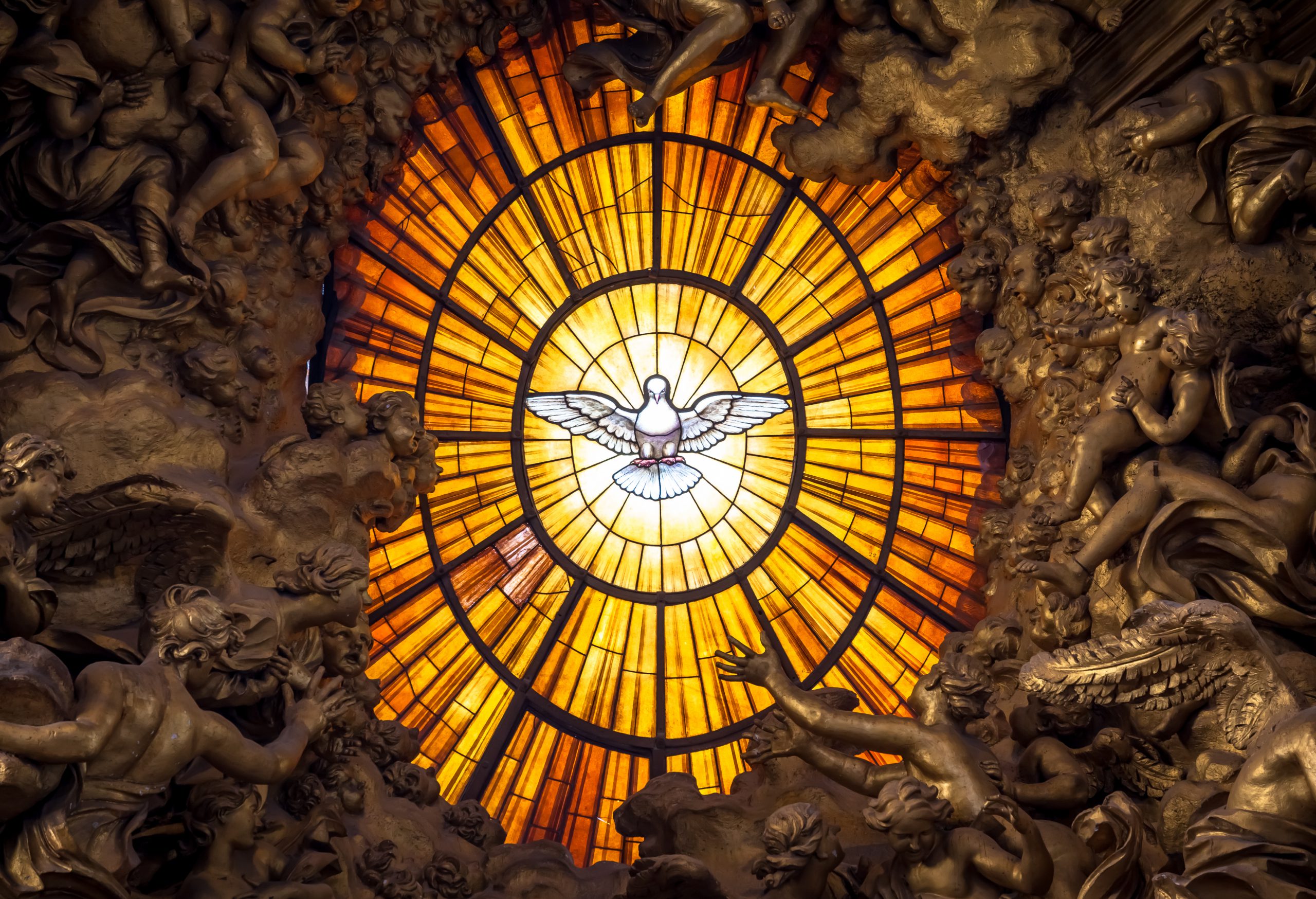
ROME, ITALY - AUGUST 24, 2018: Throne Bernini Holy Spirit Dove Saint Peter's Basilica Vatican Rome Italy. Bernini created Saint Peter's Throne with Holy Spirit Dove Stained Glass Amber in 1600s
Question: This might be a stupid question, but I’m going to ask it anyway. I know that we talk about the Holy Spirit a lot, but what exactly is the Holy Spirit?
I’m so grateful for this question, because it’s not stupid at all; on the contrary, it’s actually a very common question, and therefore worth addressing.
By way of an initial answer, I’d like to address why it’s such an important question. For many Catholics, and indeed for many Christians in general, the Holy Spirit seems like the power or “force” of God (think “the force” from the Star Wars movies). The Holy Spirit—God’s Spirit—strikes many of us as the means (again, the “power”) by which God acts and works.
To be sure, there’s a lot of truth in that; the Holy Spirit is indeed the power of God. The Holy Spirit is the means by which God accomplishes, in essence, everything: from creation to the Incarnation to our personal sanctification. God the Father speaks his Word (the Son), and it is by means of the Holy Spirit that the will of the Father and the Son (the Word) is accomplished.
But the Holy Spirit is so much more than merely the power of God. The Holy Spirit is, in fact, a person. The Holy Spirit isn’t merely something, he is someone.
It’s helpful here to recall the words we say almost every Sunday at Mass, the words of the Nicene Creed:
“I believe in the Holy Spirit, the Lord, the giver of life, who proceeds from the Father and the Son, who with the Father and the Son is adored and glorified, who has spoken through the prophets.”
The Holy Spirit isn’t just the power of God. The Holy Spirit isn’t an it, the Holy Spirit is a he—the Holy Spirit is the third person of the Holy Trinity. As we see in the Creed, the Holy Spirit is “the Lord.” We often speak of God as Lord, or of Jesus as Lord, but do we reflect on the fact that the Holy Spirit is also the Lord?
Let’s look at what a “lord” is. The dictionary tells us that a lord is “someone or something having power, authority or influence, a master or ruler.” Again, most of us recognize how we can speak about God as Lord, or specifically about Jesus as Lord, but even though we profess the Nicene Creed every Sunday, we are less likely to think about the Holy Spirit as Lord, as someone who is our master, who has authority and influence.
And yet he is. As the Creed continues, it is in fact the Holy Spirit who is the “giver of life”: it is the Holy Spirit by whom God not only creates us—in each moment—but also transforms us. It is the Holy Spirit, in other words, who actually gives us the new life that Jesus won for us in his death and resurrection.
He not only gives us that new life, but he also—together with the Father and the Son—comes to dwell within each of us at the moment of our Baptism. We read in St. Paul’s first letter to the Corinthians these words: “Do you not know that your body is a temple of the Holy Spirit within you, whom you have from God?” (1 Cor 6:19).
Just as we considered the word “lord,” it’s worth reflecting a bit more deeply on what it means to say we are “temples” of the Holy Spirit. For most of us, when we think of a “temple,” we think of a place of worship, like our parish church.

But for St. Paul and other first century Jews and Jewish Christians (like Jesus himself), the word “temple” meant so much more than just a place of worship. We know, for instance, that Jews would (and still do) gather together for prayer and for Scripture reading and study in synagogues. But St. Paul does not say that we are a “synagogue of the Holy Spirit”… he says we are a temple of the Holy Spirit.
For him and others in his time, the word “temple” called to mind just one thing: the magnificent Temple in Jerusalem, first built by King Solomon more than 900 years before Jesus, and then (because it was destroyed by invaders in 586 B.C.) rebuilt by Herod a few years before Jesus’ birth.
The closest equivalent for us as Catholics today is probably St. Peter’s in Rome, but even that incredible church doesn’t have the same connotation to us that the Jerusalem Temple did for the Jews and Jewish Christians of Jesus’ time.
So when St. Paul tells us each of us is a temple of the Holy Spirit, the significance of that is far greater than most of us realize: he is comparing each Christian to that incredible building in which God dwelt with his people.
When we celebrate Pentecost in a few weeks, let us pray for the grace to recognize the significance of what St. Paul said and praise God for the great gift of his Spirit!


